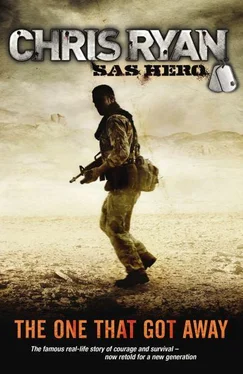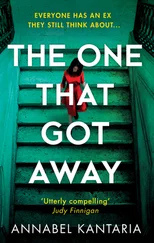‘That’s the most amazing story I’ve heard in years,’ Downing said. There was a pause, and he asked, ‘What have the doctors said?’
‘Well — I haven’t seen a proper doctor yet.’
He seemed shocked. ‘I sure am sorry to have dragged you up here,’ he said, looking worried and a bit embarrassed. ‘You ought to have seen a doctor before you came. Tell you what, though: we’ve got some go-faster surgeons on the base. I’ll have one of them look at you.’
I wasn’t quite sure what he meant by a ‘go-faster’ surgeon, but I went to see one of them willingly enough. A quick examination confirmed that I had frost-nip in my fingers and toes. The doctor said that my feet would heal up in time, but that I needed some dental work done. When I told him about the nuclear effluent, he said I should certainly have a blood test.
When I got back to Downing, he said, ‘I know I’m asking a lot, but will you talk to ‘A’ Squadron? They’re deploying tonight, and I know they’d appreciate it. You could probably give them a load of help.’
Of course I agreed. So I told the story yet again, this time to about forty guys, and at the end they burst into applause, with everyone wanting to shake my hand.
* * *
Back at Al Jouf, I found myself wondering with other guys in the squadron about what could have happened to the rest of our patrol. I think I believed in my heart of hearts that Vince was dead, and Stan the same — or possibly captured. But I couldn’t understand why the other five hadn’t come out, or why there was no news of them.
People began to assume that the rest of the patrol had died, and I heard that I would probably have to go on a tour of New Zealand, Australia and all round England to talk to the families of the guys we’d lost.
In spite of everything, I felt reasonably well — so when ‘B’ Squadron began getting ready to drive into Iraq as the security force on a major re-supply for ‘A’ and ‘D’, I asked the CO if I could go with them. Luckily he realized that I was a long way from being fit, and said, ‘Not a chance.’
Because my teeth were still so slack, I made arrangements to see a dentist. Before my appointment, I was warned that I mustn’t under any circumstances tell him where I’d been. When I got into the surgery, the dentist proved a really sensible, nice guy. He asked his assistant to leave the room. ‘There’s obviously something wrong,’ he said.
‘Yes,’ I replied, ‘I’ve had a bad eight days.’
‘I should say so. What do you do for a living?’
‘I test Land Rovers.’
‘OK. I’m not interested in what you’ve done. But your mouth’s in a serious state. Your gums show signs of malnutrition; they’re receding — that’s why they’re bleeding. I can see the roots of your teeth. There’s a chance you’ll lose a few. I’ll have to take two out, anyway.’
To this day my gums haven’t fully recovered; some teeth are still loose. Otherwise, I made a full physical recovery, though it took six weeks for feeling to come back into my fingers and toes.
A blood test taken in a makeshift hospital on an American airbase revealed nothing wrong — but evidently the doctor who did it missed something, because another test, carried out in the UK, showed that I had a blood disorder, caused by drinking dirty water from the Euphrates.
One doctor, talking about weight loss, told me that it was safe to shed one pound — or about half a kilo — a week. When I told him I’d lost 36 lb, or about 16 kg, in a week, he said it was impossible.
‘Well it happened,’ I told him.
To which he replied, ‘That’s not good.’
The mental scars took far longer to heal. In the Gulf I began to suffer from a recurrent nightmare. I’m walking through the dark along a road. Ahead of me I see two hooded figures, dressed in black, on top of a mound. I know they’re the two men I killed in the nuclear complex, but still I go up to them to ask directions. The night is very dark, and it’s as if black rain is falling. As I come close, I see the eyes of the second man, wide with fright, and at the last second a knife-blade flashes as he makes a lunge at me. At that point I wake up, sweating with terror.
When the dream began, I realized that it was caused by feelings of guilt.
I also felt guilty about Vince. There was I, a fully trained mountain guide, and I’d failed to do the obvious thing of tying him to me when we were going down with exposure. Even if I’d just held him by the hand, or kept him in front of me where I could see him, I might have saved him. I knew the reason was that I had been suffering from exposure too — but that couldn’t bring him back. On the other hand, he might have slowed us down so much that the cold would have got the better of us all.
Later, when I was back in the UK, I met Vince’s mum, dad, widow and brothers, and told them the full story. It was hard for them to accept that Vince — who they had envisaged as indestructible — had frozen to death in the desert.
On 24 February 1991, the ground war was launched at last. I spent the time glued to CNN television — there was one big set in the corridor between the hangars. When the Coalition began taking prisoners, we couldn’t believe the numbers: 20,000, 40,000, 50,000 — we kept a scoreboard.
In five days, unbelievably, it was all over.
The squadron came back from Al Jouf to Victor, getting ready to go home. Moves were being made to bring ‘A’ and ‘D’ Squadrons back as well. Then the OC said that as soon as an aircraft to the UK became available, I would be on it.
Just after the ceasefire I was in one of the hangars when somebody rushed in, shouting, ‘Hey! We’ve seen Dinger on the telly!’
Electrified, I ran back with him to see if I could catch a glimpse. There’d been shots of the Iraqis handing over Allied prisoners.
‘Are you sure it was him?’
‘Yeah, yeah, it was Dinger all right.’
We sat there, waiting for the next news programme. When it came on, someone shouted, ‘There he is!’
Sure enough, it was Dinger — and a moment later we saw Stan as well. Both were in Baghdad. They were wearing orange prison overalls, sitting at a table, on their way to being handed over to the Red Crescent (the local equivalent of our Red Cross). It was easy enough to spot Dinger, but Stan was harder to pick out, because he had lost a lot of weight and had become quite gaunt.
Just to see them was exciting. We knew those two were safe — but what about the others?
There were still five men missing from Bravo Two Zero: Bob, Vince, Legs, Mark and Andy.
In addition, we thought a guy from ‘A’ Squadron called Jack had been killed on another operation. When we heard through the Regiment that the Iraqis had four more prisoners to release, we reckoned that meant one of our guys must have died as well as Jack. Was that Vince?
Details trickled out slowly. The first to reach us, via Dinger, was that Legs had died from hypothermia after trying to cross the Euphrates. Then, to our amazement, we heard that Jack had survived, and was also about to be released. That meant that another member of Bravo Two Zero must have gone down. Rumours flew about, but there was no official information.
Very soon after that, a message came telling us to pack. I would be on the first aircraft going home. When the Hercules landed at Cyprus and we walked into the terminal, someone said, ‘Oh — we’ve just had some of your guys come into the hospital.’ Immediately the OC got on the phone, but — quite rightly — security was tight and nobody was being allowed to speak to the released prisoners, so he had some trouble getting through. In the end he managed it, and I spoke to both Dinger and Stan.
Читать дальше












